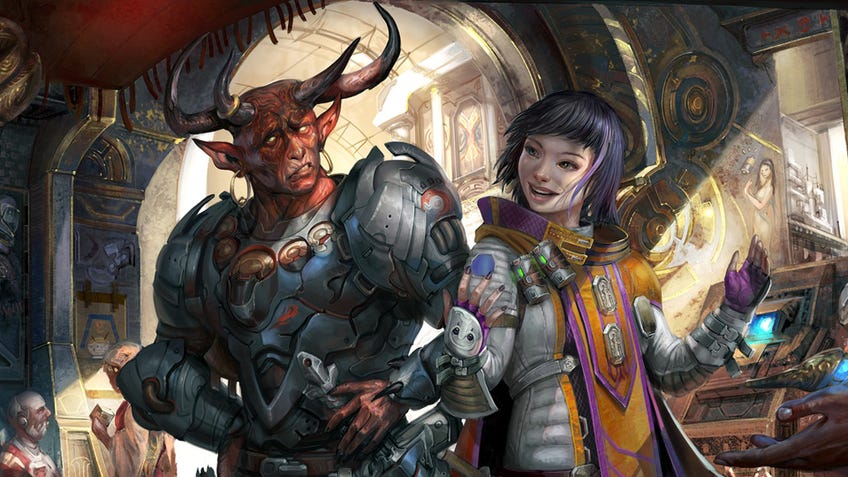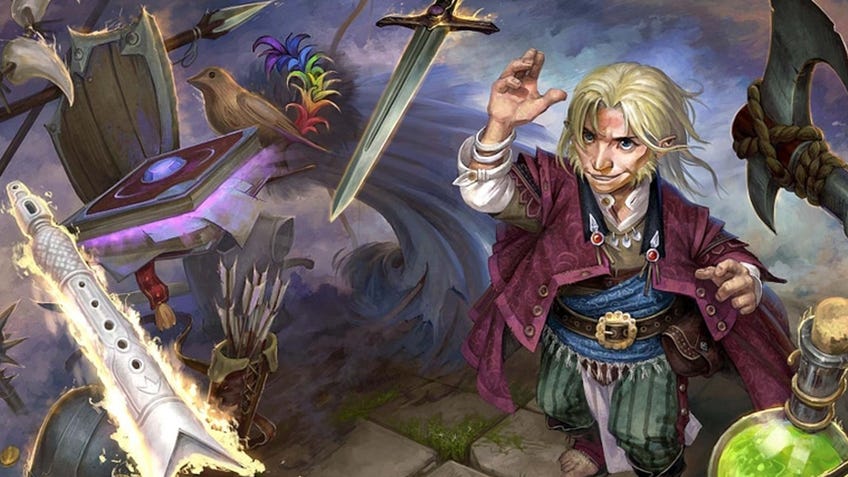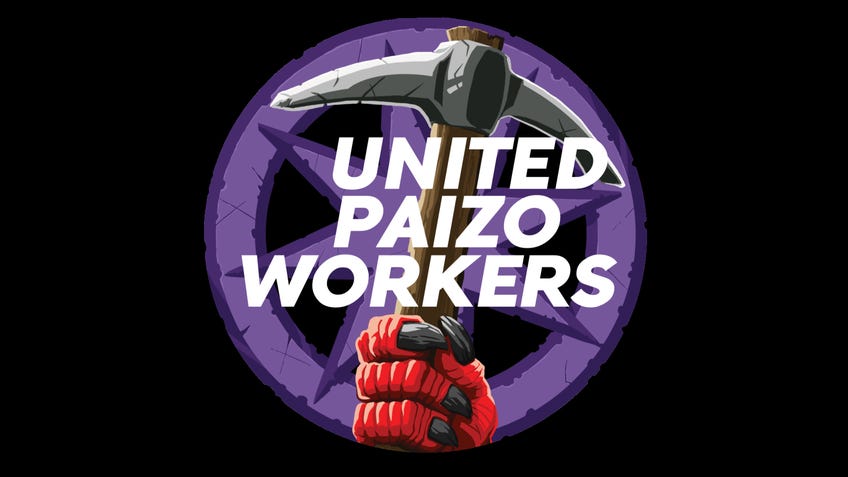United Paizo Workers: How the Pathfinder creators organised, and what’s next for tabletop RPGs’ first union
Paizo employees have their recognition, but the hardest fights might still be on the horizon.
Jenny Jarzabski had been preparing to unionise for most of their life. The Starfinder developer grew up with a father active in the United Auto Workers union, doing their homework or colouring pages on the floor of the union hall after school. The local chapter was hundreds strong and argued frequently, so Jarzabski learned early the vocabulary and mechanisms of organised labour.
Fast forward to 2020 and a job at Paizo, the company responsible for both the Pathfinder and Starfinder tabletop RPGs. Jarzabski told Dicebreaker in an interview that they were initially surprised at the lack of union representation at the publisher, given their personalhistory and several past jobs that offered membership in existing organisations.
“Then, I realised almost no-one in the game industry in this country has a union,” they said.
Jarzabski sorely felt that lack as the working conditions at the Redmond, Washington publisher came into focus. A fundamental disconnect and lack of communication from management underscored salaries well below the area’s cost of living, a policy of staff needing to relocate to Washington for work (though this would not always apply to upper management, according to UPW) and regular periods of crunch on projects. People started talking, Jarzabski said. Staff began sharing their stories and realising something needed to change.
In September of this year, customer service and community manager Sara Marie was fired from Paizo for reasons the publisher still hasn’t provided. Soon after, Marie’s coworker Diego Valdez voluntarily quit. This sparked an outcry from fans and workers, both past and current, and many began sharing stories of their time at Paizo that seemed to point to a history of executive negligence and interference, transphobia, bigotry and serious allegations of abuse and sexual misconduct.
If nothing improved and things continued as they were, we didn't want [Paizo's] contracts.
All of this broke the week before Gen Con 2021, and many employees - Jarzabski included - worried about the community response. They offered each other support and solidarity in case the panels and show floor proved hostile towards the people they felt had done nothing wrong. Players and fans largely sided with the staff in the end, which Jarzabski said left them feeling “this surging of community”, as if some animus of change had suddenly thrown its weight behind them. They weren’t alone.
Jarzabski and their co-workers returned from Gen Con to find their inboxes full of messages of support from a sizeable freelance pool that regularly worked with Paizo. Roughly 40 artists, writers and designers had copied them in emails to executives announcing that they would be withholding work from the publisher until the employees’ concerns were addressed and conditions improved.

Freelance writer and game designer Jessica Redekop took part in the unofficial strike and told Dicebreaker via email that while the concern over lost contracts, burned bridges and blacklisting was real, the moral imperative to aid those the freelancers considered colleagues and friends outweighed the risks. “If nothing improved and things continued as they were, we didn't want those contracts,” she said. “We weren't willing to continue working with Paizo without change.”
The management side of things tends to be not very honest in this process because they have a lot more to gain by hiding information and pretending to be poorer than they are.
The freelancers had talked throughout the week of Gen Con, collaborating on how they could wield their influence against what they believed were untenable conditions and unethical behavior from executives. Those who could refuse work did so, either by stating they would not be accepting further contracts, withholding those already accepted, or both.
This solidarity from a group of non-staffed workers with everything to lose was the final galvanising jolt the tired and frustrated Paizo workers needed to transform their anticipation into collective action. “I don't think that would have happened if the freelancers hadn't done their work stoppage,” Jarzabski said. “That's also how we knew we could make this happen. We could accelerate the process.”
On October 14th, the United Paizo Workers released a public letter to Paizo’s executive leadership, signed by 30 employees, detailing their intent to form a union within the company with assistance from the Communications Workers of America. The publisher decided to voluntarily recognise the union eight days later, making United Paizo Workers the first successful union in the tabletop RPG industry and only the second in analogue gaming behind Cards Against Humanity Workers United.
The days between were filled with what Jarzabski called “an eerie silence” from management. Still in a work-from-home environment (the terms of which were extended in Paizo’s public response to the recent allegations), some appeared in Zoom meetings wearing shirts with the union’s official logo, or as their camera’s background. Days later, chief creative officer Erik Mona told Jarzabksi and others in an editorial meeting that “[management] is working towards a resolution, and they’re hoping to do it soon”.
The positivity read well to the nascent union - if voluntary recognition was denied, the workers would enter a weeks-long voting process that is often accompanied by propaganda and union-busting techniques, such as singling out vulnerable workers and reiterating a family dynamic in the workplace. “It didn’t happen, though,” Jarzabski said with visible relief. “This is just step one for us and for Paizo and the executives, but I do see it as an act of good faith.”
Bosses break the law all the fucking time.
Ian Price, an organising mentor and branch treasurer for the Greater Chicago Industrial Workers of the World, hopes UPW keeps their guard up going into the contract bargaining phase with Paizo’s leadership. Voluntary recognition removes a significant hurdle, but the employees will need to send a bargaining unit of representatives to hash out the details of a contract and get that agreement signed before the union has any real weight to throw around.
“It's going to be each side trying to wrestle for their best advantage,” Price told Dicebreaker. “In my experience, the management side of things tends to be not very honest in this process because they have a lot more to gain by hiding information and pretending to be poorer than they are.”

Price pointed to wage theft as a prime example of behaviour which is technically illegal but can be obfuscated by internal processes and “the basis of ‘Whoops, I forgot’”. This path of financial least resistance is something he sees in the majority of companies who find themselves suddenly having to negotiate with a union. Behaviour that management never questioned before - forcing employees to use their own computers, phones, mics and cameras for work, unsafe working conditions, toxic work environments - are suddenly on the table as necessary and immediate changes.
“Is their recognition of the union going to mean that they bargain in good faith? I'm sure that they mean to bargain in what they feel is good faith. I just think that following their incentives, as bosses, would lead them to things that will end up not being as good faith as they would claim,” Price said. “Bosses break the law all the fucking time.”
Then, I realised almost no-one in the game industry in this country has a union.
Two weeks after voluntarily recognising the UPW, Paizo CEO Lisa Stevens announced that Mike Webb and Jim Butler had been added to the upper leadership via two newly-created executive roles. The UPW responded later that same day, claiming “this sudden change in leadership occurred within 48 hours of the UPW announcing its existence”. This would mean Paizo added two new executive roles only days before its public endorsement of the union’s efforts.
“It is incredibly difficult to see this move as anything other than a continuation of questionable practices, and antithetical to the stated concerns of the Paizo workers,” the letter continues. “When pressed by employees, management responded with an internal memo indicating that this change has been made to add more expertise and voices to the leadership team, which was a new designation for what had previously been known as the executive team.”
Dicebreaker spoke with Jarzabski before November 4th, when the two executive appointments were made public. At that time, they remained positive about the union’s immediate future in bargaining for better pay and changes to the work relocation requirements, along with UPW positioning itself as the beginning of something bigger in the tabletop RPG space.
“I do see this as the potential to really start a movement in the gaming industry in our country. I hope to see it,” Jarzabski said. “The hardest part of unionising an industry is just getting that first crack in the dam. Then, it's like a flood.”


